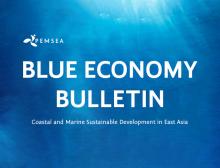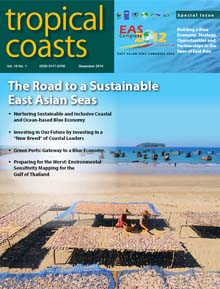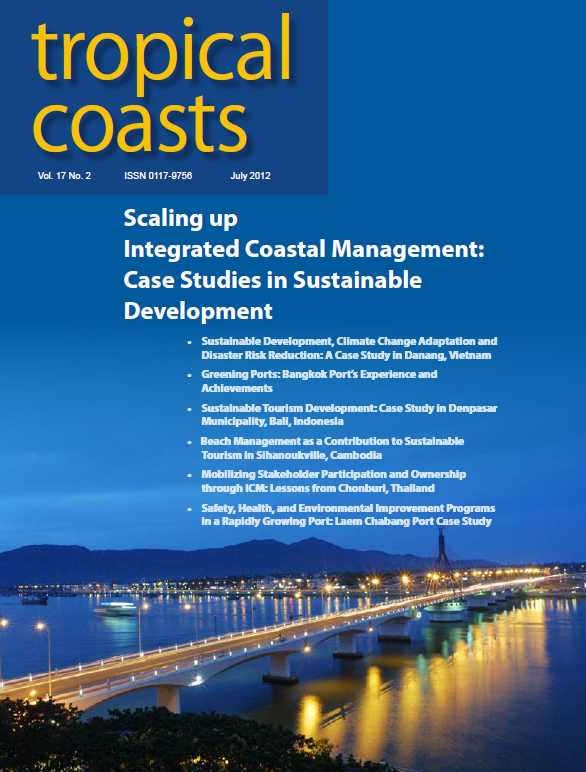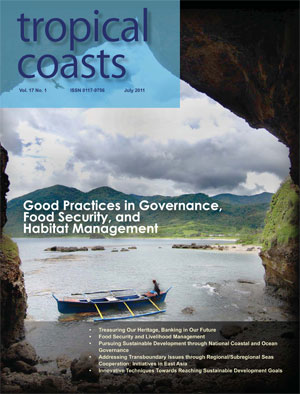
Breadcrumb
-
Blue Economy Bulletin February 2017
Welcome to the first issue of the Blue Economy Bulletin for 2017! To begin the year, please help us continue to improve our delivery of relevant blue economy updates by answering this short survey (less than 5 minutes).
Kicking off 2017, PEMSEA hosted a webinar in partnership with Conservation International on how the ocean’s health is being measured. A recording is available online.
We start the year with good examples of progress on coastal and ocean sustainable development. Stanford scientists found proof that large marine protected areas create positive impacts on reef shark populations and UC Santa Barbara partnered with global leaders to help secure the future of the oceans. In Central Java, a restored mangrove forest generates ecotourism revenue for a local community.
Governments all over the world are strengthening their policies and enforcement on coasts and oceans. In East Asia, Vietnam announced its marine plans, Indonesia revealed its desire to crack down on fish aggregating devices, China committed to ocean economy demonstration zones and the Philippines strengthened its protection of a marine biodiversity hotspot. In Europe, countries are pushing for increased transparency in fisheries outside the EU.
Innovations such as blockchain technology, breakthrough methods of recycling ocean plastic and sustainable aquaculture feed offer examples of some of the new technologies and practices that can help solve some of our most pressing ocean issues. Organizations continue to push the boundaries of conservation finance with a new report from Forest Trends’ Ecosystem Marketplace on private capital invested towards environmental conservation, and leading global banks launching a framework aimed at channeling investments towards achieving the UN SDGs. Read on for more.
Follow the latest updates on blue economy and coastal sustainable development in East Asia on Facebook and Twitter at @PEMSEA. We welcome your feedback. -
Blue Economy Bulletin December 2016
Welcome to the final issue of the Blue Economy Bulletin for 2016! Thank you for your continuing interest in blue economy news and events including industry highlights, policy updates and more from East Asia and around the world.
Moving into the end of the year, PEMSEA is pleased to announce a new partnership with the World Ocean Council for ocean industry engagement in East Asia. PEMSEA has also been busy gathering experts to promote blue economy investments and providing training on marine protected areas through a workshop in Zhoushan, China co-organized with the State Oceanic Administration.
Increased interest in financial investments for sustainability is evident in the launch of a new funding platform for sustainable development projects in Asia. The European Union recently strengthened its commitment to ocean governance, and pledged hundreds of millions of Euros to boost the ocean energy industry. In the shipping industry, the International Maritime Organization implemented stricter requirements to reduce sulfur emissions from ships. Indonesia received support for its blue economy efforts from the U.S., while Portugal declared its desire to invest in Vietnam’s marine industries. New innovations in eco-tourism and seafood traceability mark progress in transforming blue economy for environmental and social benefit.
Follow the latest updates on blue economy and coastal sustainable development in East Asia on Facebook and Twitter. We welcome your feedback, and please let us know if there are other blue economy topics you would like to see in future newsletters and programs.
-
Blue Economy Bulletin October 2016
Welcome to the latest issue of the Blue Economy Bulletin, your source for blue economy news and events including industry highlights, policy updates and more from East Asia and around the world.
Globally, more governments and organizations are taking positive steps towards sustainability in the coastal and marine environment. The PEMSEA Network of Local Governments recently convened to discuss its plans to achieve the UN Sustainable Development Goals (SDGs), while PEMSEA stepped up its leadership for sustainability of ASEAN ports. The Economist gathered experts to discuss investing in a transition to sustainable fisheries. The IUCN Conservation Congress featured a number of commitments and launches including a new platform for sharing coastal management solutions and a new coalition for conservation investment. The Philippines tightens implementation of its fisheries code to target illegal fishing, just as the US pledges to enforce standards on marine mammal bycatch across imported seafood products. PEMSEA hosted its latest Blue Economy Webinar, covering electronic catch documentation and traceability for addressing illegal fishing.
New solutions continue to emerge for the marine space, including application of blockchain technology for seafood traceability, big data for improved catch prediction and efficiency and sustainable practices in shrimp aquaculture. Innovative financing approaches including a new fisheries investment fund and significant commitments to support marine protected areas hold promise.
Follow the latest updates on blue economy and coastal sustainable development in East Asia on Facebook and Twitter (@PEMSEA). We welcome your feedback, and please let us know if there are other blue economy topics you would like to see in future newsletters and programs.
-
Blue Economy Bulletin August 2016
Welcome to the latest issue of the Blue Economy Bulletin, your source for blue economy news and events including industry highlights, scientific developments, policy updates and more from East Asia and around the world.
In this issue, learn about how PEMSEA’s work supports achievement of the UN Sustainable Development Goals (SDGs) and how PEMSEA assisted Cambodia as an occurrence of “red tide” impacted its fisheries and tourism industries. The landmark Port State Measures Agreementcame into force to battle illegal fishing, and another potential landmark case has been brought against international companies for alleged human rights violations due to the impacts of climate change in the Philippines. Vietnam looks to increase its fisheries exports by US$7 billion, just as a large company on its coast admits to its role in a massive fish kill earlier this year. Companies taking steps to protect the health of the oceans in this issue include Adidas’ efforts to recycle ocean plastic waste and Cathay Pacific’s banning of shark fin cargo. And as one organization points to the important role coral die-off may play in focusing attention on the impacts of climate change, another analysis finds that protecting coral reefs has one of the best payoffs of all the SDGs.
Companies increasingly recognize the importance of understanding the value of ecosystem services to their business. Together with our partners, PEMSEA hosted a series of webinars on ecosystem services valuation, which are now available online.
Follow the latest updates on blue economy and coastal sustainable development in East Asia on Twitter @PEMSEA. We welcome your feedback, and please let us know if there are other blue economy topics you would like to see in future newsletters and programs.
-
Blue Economy Bulletin June 2016
Welcome back to the Blue Economy Bulletin, your source for blue economy news and events including industry highlights, scientific developments, policy updates and more from East Asia and around the world.
Since the last issue, PEMSEA hosted the first installment of its new Blue Economy Webinar Series, featuring two leading experts who shared the latest research and thinking on blue economy. A recording of the event is available online. PEMSEA also released an infographicdescribing how its Sustainable Development Strategy for the Seas of East Asia supports achieving UN SDG 14, and several other Sustainable Development Goals.
As the UN concluded its first round of negotiations on regulating marine biodiversity on the high seas, recent studies present sobering news on the health of our coral reefs and fisheries, while scientists call for more ambitious efforts to protect the oceans. OECD provides an update on the growth potential for the ocean economy, as stories of new technologies and practices continue to roll out, such as seafloor sensors, green infrastructure, innovative fishing gear and new efforts to finance the transition to a sustainable blue economy, including a climate bond standard for marine assets and an investment platform for members of ocean industry. Read on for more.
Follow the latest updates on blue economy and coastal sustainable development in East Asia on Twitter at @PEMSEA. We welcome your feedback, and please let us know if there are other blue economy topics you would like to see in future newsletters and programs.
-
Blue Economy Bulletin April 2016
The BE Bulletin is a roundup of blue economy news and events including industry highlights, scientific developments, policy updates and more from East Asia and around the world.
With the release of the Blue Economy for Business Report and launch of the East Asian Seas Sustainable Business Network in late 2015, PEMSEA seeks to enhance the understanding of blue economy to help drive sustainable economic growth in the region. These efforts will bring together companies, investors and governments towards a common goal of blue economy growth, and in the coming months this will include the development of National State of the Coasts reports and the launch of a regional knowledge management and investment platform for blue economy. We will also be hosting regular blue economy expert webinars, the first in early Q2 this year. Stay tuned for further details.
Follow the latest updates on blue economy and coastal sustainable development in East Asia on Twitter at @PEMSEA. We welcome your feedback, and please let us know if there are blue economy-related topics you would like to see in future newsletters and programs.
-
The Road to a Sustainable East Asian Seas
This issue of Tropical Coasts focuses on building, strengthening and sustaining a blue economy for the EAS region. The breadth of discussions in this issue are taken from workshops and meetings during the East Asian Seas (EAS) Congress, “Building a Blue Economy: Strategy, Opportunities and Partnerships in the Seas of East Asia,” held in Changwon, RO Korea, on 9–13 July 2012. The fourth triennial EAS Congress touched on various facets of sustainable development, specifically the dynamic aspects of coastal and ocean governance and an ocean-based blue economy. The Congress was hosted by the Ministry of Land, Transport and Maritime Affairs and the City Government of Changwon. More than 1,200 participants from 25 countries and 23 regional and international organizations participated in the Congress, which was organized and conducted in collaboration with 24 co-conveners and 4 sponsors.
-
Scaling Up Integrated Coastal Management: Case Studies in Sustainable Development
This issue of Tropical Coasts expounds on different cases across the region that highlight the contributions of integrated and holistic management for sustainable development of coastal communities and sectors of the economy that are highly dependent on coastal resources. It features how the scaling up of ICM builds the capacity to adjust and respond to the growing challenges of a changing environment in Danang and Chonburi and contributes to the sustainable tourism in Bali and Sihanoukville. The issue also covers the implementation of the Port, Safety, Health and Environmental Management System (PSHEMS) in two major ports in the region. What is evident in the cases in this issue is that the scope of ICM implementation is growing. The case studies show that through ICM programs, the local governments and ports were able to maintain a balance between economic development and environmental and social demands and harness the potential that ICM offers. It is hoped that the experiences and lessons shared in these case studies will contribute to the replication of ICM across the region.
-
Good Practices in Governance, Food Security, and Habitat Management
This issue of Tropical Coasts expounds on the challenges and good practices in Ocean and Coastal Governance; Habitat Protection, Restoration and Management; and Food Security and Livelihood Management. It features discussions held during the International Conference on Sustainable Coastal and Ocean Development during the East Asian Seas Congress in Manila, Philippines, on 23-27 November 2009. The third triennial EAS Congress, hosted by the Government of the Philippines and co-organized by the Philippines Department of Environment and Natural Resources, attracted 1,480 participants, 100 exhibitors, 51 co-conveners and supporting organizations, and numerous sponsors.



